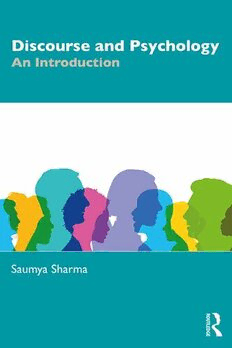Table Of ContentDISCOURSE AND PSYCHOLOGY
This book presents a unique understanding of the interdependence between
language and psychology and how one’s speech is shaped by and in turn shapes
one’s thoughts, beliefs, and emotions. Drawing on the tenets of discourse analysis
and psychology, it presents a comprehensive guide to a new and burgeoning
area in linguistics and critical theory. The volume focusses on individual and
group behaviour to show how identity formation is as much dependent on the
psychological state as on social surroundings and context. It introduces various
concepts from the sociocognitive framework, discursive and critical psychology,
highlighting the myriad ways of approaching the complex interface between
text, sociocultural factors, and cognitive processes.
An indispensable guide to the complex world of language and the unconscious,
the volume will be of interest to students and scholars of linguistics, applied
linguistics, sociolinguistics, psychology and behavioural science, language, and
critical theory. It is also a must-read for the general reader interested in language,
communication, and social intelligence.
Saumya Sharma is Assistant Professor (Linguistics) at the English and Foreign
Languages University, Lucknow Campus, India. She was a guest faculty member
at the Indian Institute of Technology Kanpur for a year, where she taught
a course on composition and communication skills. Her research interests
include examining the discourse-psychology interface, particularly gender
issues, vocabulary teaching, and critical pedagogy. She has published in the
areas of English-language teaching, stylistics, and critical discourse analysis.
Some of her recent publications include L anguage, Gender and Ideology: Constructions
of Femininity for Marriage (Routledge, 2018) and Common Errors in Everyday
English (2017).
DISCOURSE AND
PSYCHOLOGY
An Introduction
Saumya Sharma
First published 2020
by Routledge
2 Park Square, Milton Park, Abingdon, Oxon OX14 4RN
and by Routledge
52 Vanderbilt Avenue, New York, NY 10017
Routledge is an imprint of the Taylor & Francis Group, an informa business
© 2020 Saumya Sharma
The right of Saumya Sharma to be identified as author of this work
has been asserted by her in accordance with sections 77 and 78 of the
Copyright, Designs and Patents Act 1988.
All rights reserved. No part of this book may be reprinted or reproduced
or utilised in any form or by any electronic, mechanical, or other
means, now known or hereafter invented, including photocopying and
recording, or in any information storage or retrieval system, without
permission in writing from the publishers.
Trademark notice : Product or corporate names may be trademarks
or registered trademarks, and are used only for identification and
explanation without intent to infringe.
British Library Cataloguing-in-Publication Data
A catalogue record for this book is available from the British Library
Library of Congress Cataloging-in-Publication Data
A catalog record for this book has been requested
ISBN: 978-1-138-09068-2 (hbk)
ISBN: 978-0-367-34795-6 (pbk)
ISBN: 978-0-429-34232-5 (ebk)
Typeset in Bembo
by Apex CoVantage, LLC
To those who taught me that the beads of language
are strung on the thread of psyche, shaping society
CONTENTS
Introduction 1
1 Discourse: history and meanings 3
2 Sociocognitive approaches 17
3 Discourse and action 36
4 Discourse, repertoires and out-there-ness 49
5 Rhetoric and ideological dilemmas 63
6 Psychosocial studies and critical psychology 74
7 Analysis 91
8 Conclusion 107
Weblinks 112
Bibliography 114
Index 127
INTRODUCTION
This book is a primer to the vast yet engaging area of discourse and psychology,
and the idea for writing it germinated in my attempts to find answers to the
following questions. How can an individual’s discourse(s) be related to how they
think and feel? To what extent and in what ways is language an indicator of one’s
psychological state? And can a person’s identity be constructed both socially and
psychologically? While doing research to relate these questions, I realised that
there is no single answer but many answers, depending on how one is approach-
ing the topic and how discourse is understood and defined in one’s study. This
work, therefore, introduces the reader to the multiple ways in which one’s lan-
guage and psychology can be explored. Since a lot of research already exists in
the broad areas of language, cognitive psychology and psycholinguistics, drawing
on concepts from each other, I have not dealt with those areas. In comparison,
I use language in the discursive sense, and my work exclusively focusses on the
meanings of discourse and the interrelationships between discourse and psychology.
It describes how psychologists understand and use discourse in psychology to
explore human behaviour, and how discourse analysts have employed psycho-
logical concepts to examine the links between discourse, power and society. It
also explains the use of discourse by psychoanalysts to investigate the intersec-
tions of the social and psychological dimensions, and wherever possible, attempts
have been made to highlight how identities are constructed through the complex
matrix of discourse, psychology, power and ideology as many practitioners have
examined the operations of power and/or ideology in human relations and soci-
ety at large. The book, therefore, is interdisciplinary in focus, delving on several
issues and highlighting that human subjectivity is myriad and richly textured.
Since several notions are proposed by the theorists and they themselves belong
to different areas, it became important to explain each person’s perspective to
avoid conceptual confusion. Thus, each chapter introduces one or more approach

